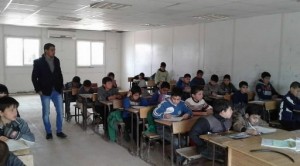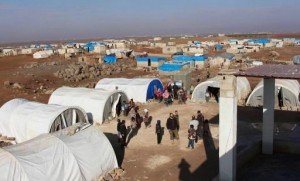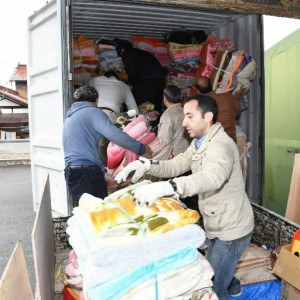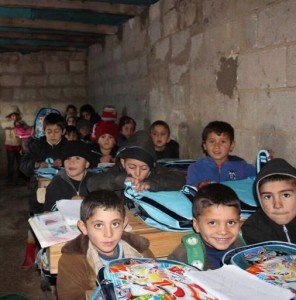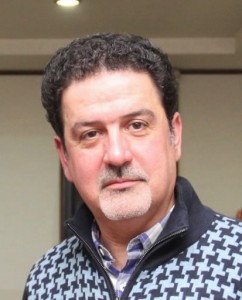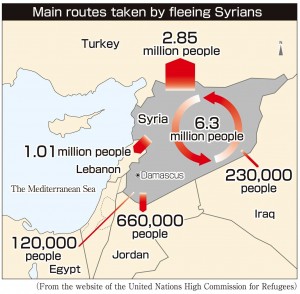Peace Seeds: Teens in Hiroshima Sow Seeds of Peace (Part 41)
Mar. 16, 2017
Part 41: Syrian children live harsh lives in refugee camps
In March, it will be six years since anti-government demonstrations against the oppressive regime of President Assad began in Syria. Currently, about half of Syria’s people have been displaced from their homes. Around 6.3 million are living within the country while about 4.9 million have fled for other nations, including Turkey, Lebanon, and Jordan. These numbers are equivalent to the combined population of the nine prefectures in the Chugoku and Shikoku regions. Some people have also fled to Europe.
Half of these refugees are children. Many children are forced to live difficult and destitute lives. Unable to attend school, they suffer psychological problems, without hopes or dreams for the future.
The junior writers of the Chugoku Shimbun asked Syrian people about the children victimized by this conflict. The harsh conditions these children face, far beyond what we imagined, left us speechless.
We also gathered information from people in Hiroshima who are making efforts to lend support to those suffering in Syria. We learned what we can do to help, too, and we encourage you to join us.
Harsh conditions in refugee camps
Eighty thousand Syrian refugees live in the Zaatri Refugee Camp in the northern part of Jordan. At a junior and senior high school where a male teacher, 33, works, the girls have classes in the morning and the boys have classes in the afternoon. Sometimes as many as 110 students study in one classroom. With one class lasting 35 minutes, the students study for about three hours in total. There are no breaks. The teacher said, “The students aren’t able to focus on their lessons.”
The children who have attended school previously in Syria study pretty hard, he said, but the children going to school for the first time at the camp are less interested in studying. The teacher explained, “I think it’s because their parents couldn’t take proper care of them. They tend not to respect their teachers.” It is also difficult for the children to study because the electricity at the camp works only sporadically.
In addition, there is no option for college at the camp. Even when students want to go on to college, only a handful of them are able to realize this dream by obtaining a scholarship from the Jordanian government or from the United Nations. And they are unable to look forward to a better future because no jobs are available and they cannot return to Syria. While school supplies are provided by the United Nations and the students have textbooks, it is difficult for them to study properly with supplemental materials, like maps and specimens. (Atsuhito Ito, 13)
Limited water and electricity
A female teacher, 42, has taken refuge in a safe place in the southern part of Syria with her sons since 2013. One boy is in his second year of junior high and the other is in his third year of high school. But water and electricity are available for only one hour out of every five hours. It is difficult for the refugees to get needed information by watching the news on TV, and they are unable to use an air conditioner or electric fan, even during the hot summer in that desert region. Moreover, prices have increased sharply, and oil is particularly expensive, so they have difficulty staying warm in winter.
Before the civil war, electricity could be used normally. Now families are forced to live uncomfortable lives and they cannot return to their homes, so family members grow irritable and their stress builds up.
The woman’s two sons have developed fears or worries over minor things since the civil war broke out. Though they still generally go to school, their future is uncertain. They may be able to attend college, but it’s hard for them to have hopes and dreams. Under such circumstances, their motivation has been undermined. (Hinako Okada, 15)
Difficulties with language and discrimination in Turkey
One man, 35, who works for an IT-related company, fled from Damascus, Syria to Ankara, Turkey in 2012.
In Turkey, he has had difficulty with the difference between the Turkish and Arabic languages as well as discrimination. In particular, he is worried about his daughter, who is 6 and in the first grade. He said, “She was treated differently in preschool because she’s Syrian and spoke a different language.” She has since joined an online program for elementary school children, which is based in the United States, and takes lessons at home via the Internet.
In Turkey, he said, the number of Turks who look down on Syrians is growing and he would like to move to another country if he has the chance. But Western nations have become strict about accepting immigrants, and his family would face discrimination elsewhere, too. He feels anxious about the unpredictable conditions of his life as a refugee. (Haruka Shinmoto, 17)
Support from the Japan-Syria Solidarity Association
The Japan-Syria Solidarity Association in the city of Hatsukaichi was established in 2012 to support the people of Syria. They have collected and sent winter clothes, backpacks, and school supplies since 2013. They even obtained surplus beds from a hospital at a low price and sent them to Syria. Basem Abdullah, 49, the head of the group, is originally from Syria and is now a resident of Hatsukaichi. “Many people have fled because they’re in danger if they stay home,” he said. “They’ve gathered together at various camps, but they have nothing at those places.”
The supplies donated by the group are put into containers and transported by ship. After these things arrive in Turkey around a month later, people Mr. Abdullah knows and supporting organizations deliver the supplies to refugees in Syria and in other locations.
“These things are given with everyone’s heartfelt feelings, so we only send them through reliable groups,” Mr. Abdullah said. “The things that Japanese people throw away are needed by the Syrian people. I ask you to donate them, not throw them away.” If you have rice, dried beans, or items that can be used in daily life, such as shoes, please contact him. For details, call 090-2852-7696. (Riho Kito, 15)
Nation that does not provide education has no future
Basem Abdullah is originally from Syria and has been in Japan for 22 years. He said, “There are many vulnerable children among the refugees. They have nothing to do with the war and have no responsibility for it.”
Before the civil war, the literacy rate in Syria was high, and students could go all the way through university without paying tuition fees. But once the war broke out, the situation changed completely. Children who have fled from Syria are unable to gain a proper education. Mr. Abdullah said, “If the children can’t receive an education, the nation has no future.”
“In Syria today,” he went on, “there are no people, only rocks.” Many buildings have been destroyed. Family members, relatives, and friends have fled the country and he has lost his hometown. The government no longer functions well, and many people are unable to verify their own identities. “We have become nothing more than animals,” he said.
Children have lost their natural right to receive an education, and the parents they depend on are unable to live stable lives themselves. Mr. Abdullah said, “If I return to Syria in the future, I want to support the education of the children and the reconstruction of the country.” (Hiromi Ueoka, 16)
Keywords
The conflict in Syria
A series of anti-government demonstrations, part of the so-called Arab Spring, a movement for democracy in the Middle East, spread to Syria. The militant group termed the Islamic State became involved in the conflict between Syrian government forces and anti-government armed groups, which escalated the fighting. Human rights violations involving civilians have continued.
Junior writers’ impressions
I was surprised when I learned about Mr. Abdullah’s activities, that there are people sending relief supplies from Hiroshima. For me, Syria is a distant place and I wanted to learn more about it to understand the current conditions there, beyond what I see on TV. I didn’t expect to hear from someone who’s actually lending his support to the Syrian people and knows what it was like there before the civil war. What left the biggest impression on me was when he said that there are no people now, “only rocks.” This must be distressing to him because he no longer has a place in Syria with the memories of his past, or his parents’ home, or his loved ones; it’s all gone now. I was thinking I couldn’t do anything to help the Syrian people because Syria is so far from Japan. But after meeting Mr. Abdullah, I now feel motivated to do something to help. (Hiromi Ueoka)
This was the first time I heard about how people are living in Syria. What’s happening there didn’t feel real to me because I don’t see refugees here in Japan. I think the saddest thing is that children can’t get an education because the United States and European nations look dimly on the idea of taking in refugees. I’m impressed by the parents who are trying to help their children gain an education even in conditions where they can’t get themselves out of their predicament. (Haruka Shinmoto)
Before we interviewed Mr. Abdullah, I thought it would be rude to send used things to Syria. But I learned that the Syrian people really need support and I want to help with this effort. (Riho Kito)
I was really nervous when we were going to the home of this Syrian family because it was the first time I ever interviewed someone from another country. But when we arrived there, they were waiting for us in the snow, and I felt some relief. During the interview, when we asked questions, they spoke to people abroad and told us about the situation in Syria. At the end, when we were watching a video about a refugee camp, I felt a lot more at ease and I found that I was able to convey my feelings by talking openly with each other. (Atsuhito Ito)
In Syria, some children are able to go to school, but they’re troubled by worries all the time and they have no hope for the future. I want more people to know about the situation there. (Hinako Okada)
What is Peace Seeds?
Peace Seeds are the seeds of smiles which can be spread around the world by thinking about peace and the preciousness of life from various viewpoints. To fill this world with flowering smiles, 30 junior writers, from the first year of junior high school to the third year of senior high school, choose themes, gather information, and write articles.
(Originally published on February 16, 2017)
In March, it will be six years since anti-government demonstrations against the oppressive regime of President Assad began in Syria. Currently, about half of Syria’s people have been displaced from their homes. Around 6.3 million are living within the country while about 4.9 million have fled for other nations, including Turkey, Lebanon, and Jordan. These numbers are equivalent to the combined population of the nine prefectures in the Chugoku and Shikoku regions. Some people have also fled to Europe.
Half of these refugees are children. Many children are forced to live difficult and destitute lives. Unable to attend school, they suffer psychological problems, without hopes or dreams for the future.
The junior writers of the Chugoku Shimbun asked Syrian people about the children victimized by this conflict. The harsh conditions these children face, far beyond what we imagined, left us speechless.
We also gathered information from people in Hiroshima who are making efforts to lend support to those suffering in Syria. We learned what we can do to help, too, and we encourage you to join us.
Harsh conditions in refugee camps
Eighty thousand Syrian refugees live in the Zaatri Refugee Camp in the northern part of Jordan. At a junior and senior high school where a male teacher, 33, works, the girls have classes in the morning and the boys have classes in the afternoon. Sometimes as many as 110 students study in one classroom. With one class lasting 35 minutes, the students study for about three hours in total. There are no breaks. The teacher said, “The students aren’t able to focus on their lessons.”
The children who have attended school previously in Syria study pretty hard, he said, but the children going to school for the first time at the camp are less interested in studying. The teacher explained, “I think it’s because their parents couldn’t take proper care of them. They tend not to respect their teachers.” It is also difficult for the children to study because the electricity at the camp works only sporadically.
In addition, there is no option for college at the camp. Even when students want to go on to college, only a handful of them are able to realize this dream by obtaining a scholarship from the Jordanian government or from the United Nations. And they are unable to look forward to a better future because no jobs are available and they cannot return to Syria. While school supplies are provided by the United Nations and the students have textbooks, it is difficult for them to study properly with supplemental materials, like maps and specimens. (Atsuhito Ito, 13)
Limited water and electricity
A female teacher, 42, has taken refuge in a safe place in the southern part of Syria with her sons since 2013. One boy is in his second year of junior high and the other is in his third year of high school. But water and electricity are available for only one hour out of every five hours. It is difficult for the refugees to get needed information by watching the news on TV, and they are unable to use an air conditioner or electric fan, even during the hot summer in that desert region. Moreover, prices have increased sharply, and oil is particularly expensive, so they have difficulty staying warm in winter.
Before the civil war, electricity could be used normally. Now families are forced to live uncomfortable lives and they cannot return to their homes, so family members grow irritable and their stress builds up.
The woman’s two sons have developed fears or worries over minor things since the civil war broke out. Though they still generally go to school, their future is uncertain. They may be able to attend college, but it’s hard for them to have hopes and dreams. Under such circumstances, their motivation has been undermined. (Hinako Okada, 15)
Difficulties with language and discrimination in Turkey
One man, 35, who works for an IT-related company, fled from Damascus, Syria to Ankara, Turkey in 2012.
In Turkey, he has had difficulty with the difference between the Turkish and Arabic languages as well as discrimination. In particular, he is worried about his daughter, who is 6 and in the first grade. He said, “She was treated differently in preschool because she’s Syrian and spoke a different language.” She has since joined an online program for elementary school children, which is based in the United States, and takes lessons at home via the Internet.
In Turkey, he said, the number of Turks who look down on Syrians is growing and he would like to move to another country if he has the chance. But Western nations have become strict about accepting immigrants, and his family would face discrimination elsewhere, too. He feels anxious about the unpredictable conditions of his life as a refugee. (Haruka Shinmoto, 17)
Support from the Japan-Syria Solidarity Association
The Japan-Syria Solidarity Association in the city of Hatsukaichi was established in 2012 to support the people of Syria. They have collected and sent winter clothes, backpacks, and school supplies since 2013. They even obtained surplus beds from a hospital at a low price and sent them to Syria. Basem Abdullah, 49, the head of the group, is originally from Syria and is now a resident of Hatsukaichi. “Many people have fled because they’re in danger if they stay home,” he said. “They’ve gathered together at various camps, but they have nothing at those places.”
The supplies donated by the group are put into containers and transported by ship. After these things arrive in Turkey around a month later, people Mr. Abdullah knows and supporting organizations deliver the supplies to refugees in Syria and in other locations.
“These things are given with everyone’s heartfelt feelings, so we only send them through reliable groups,” Mr. Abdullah said. “The things that Japanese people throw away are needed by the Syrian people. I ask you to donate them, not throw them away.” If you have rice, dried beans, or items that can be used in daily life, such as shoes, please contact him. For details, call 090-2852-7696. (Riho Kito, 15)
Nation that does not provide education has no future
Basem Abdullah is originally from Syria and has been in Japan for 22 years. He said, “There are many vulnerable children among the refugees. They have nothing to do with the war and have no responsibility for it.”
Before the civil war, the literacy rate in Syria was high, and students could go all the way through university without paying tuition fees. But once the war broke out, the situation changed completely. Children who have fled from Syria are unable to gain a proper education. Mr. Abdullah said, “If the children can’t receive an education, the nation has no future.”
“In Syria today,” he went on, “there are no people, only rocks.” Many buildings have been destroyed. Family members, relatives, and friends have fled the country and he has lost his hometown. The government no longer functions well, and many people are unable to verify their own identities. “We have become nothing more than animals,” he said.
Children have lost their natural right to receive an education, and the parents they depend on are unable to live stable lives themselves. Mr. Abdullah said, “If I return to Syria in the future, I want to support the education of the children and the reconstruction of the country.” (Hiromi Ueoka, 16)
Keywords
The conflict in Syria
A series of anti-government demonstrations, part of the so-called Arab Spring, a movement for democracy in the Middle East, spread to Syria. The militant group termed the Islamic State became involved in the conflict between Syrian government forces and anti-government armed groups, which escalated the fighting. Human rights violations involving civilians have continued.
Junior writers’ impressions
I was surprised when I learned about Mr. Abdullah’s activities, that there are people sending relief supplies from Hiroshima. For me, Syria is a distant place and I wanted to learn more about it to understand the current conditions there, beyond what I see on TV. I didn’t expect to hear from someone who’s actually lending his support to the Syrian people and knows what it was like there before the civil war. What left the biggest impression on me was when he said that there are no people now, “only rocks.” This must be distressing to him because he no longer has a place in Syria with the memories of his past, or his parents’ home, or his loved ones; it’s all gone now. I was thinking I couldn’t do anything to help the Syrian people because Syria is so far from Japan. But after meeting Mr. Abdullah, I now feel motivated to do something to help. (Hiromi Ueoka)
This was the first time I heard about how people are living in Syria. What’s happening there didn’t feel real to me because I don’t see refugees here in Japan. I think the saddest thing is that children can’t get an education because the United States and European nations look dimly on the idea of taking in refugees. I’m impressed by the parents who are trying to help their children gain an education even in conditions where they can’t get themselves out of their predicament. (Haruka Shinmoto)
Before we interviewed Mr. Abdullah, I thought it would be rude to send used things to Syria. But I learned that the Syrian people really need support and I want to help with this effort. (Riho Kito)
I was really nervous when we were going to the home of this Syrian family because it was the first time I ever interviewed someone from another country. But when we arrived there, they were waiting for us in the snow, and I felt some relief. During the interview, when we asked questions, they spoke to people abroad and told us about the situation in Syria. At the end, when we were watching a video about a refugee camp, I felt a lot more at ease and I found that I was able to convey my feelings by talking openly with each other. (Atsuhito Ito)
In Syria, some children are able to go to school, but they’re troubled by worries all the time and they have no hope for the future. I want more people to know about the situation there. (Hinako Okada)
What is Peace Seeds?
Peace Seeds are the seeds of smiles which can be spread around the world by thinking about peace and the preciousness of life from various viewpoints. To fill this world with flowering smiles, 30 junior writers, from the first year of junior high school to the third year of senior high school, choose themes, gather information, and write articles.
(Originally published on February 16, 2017)

